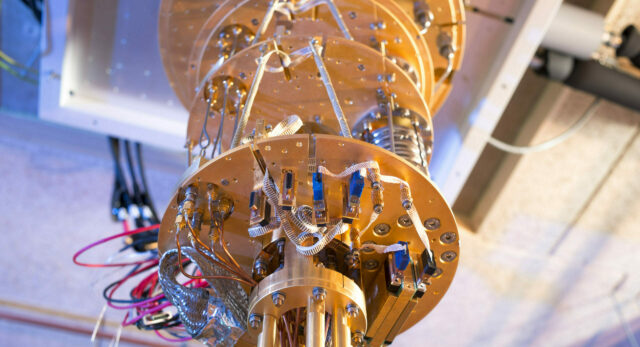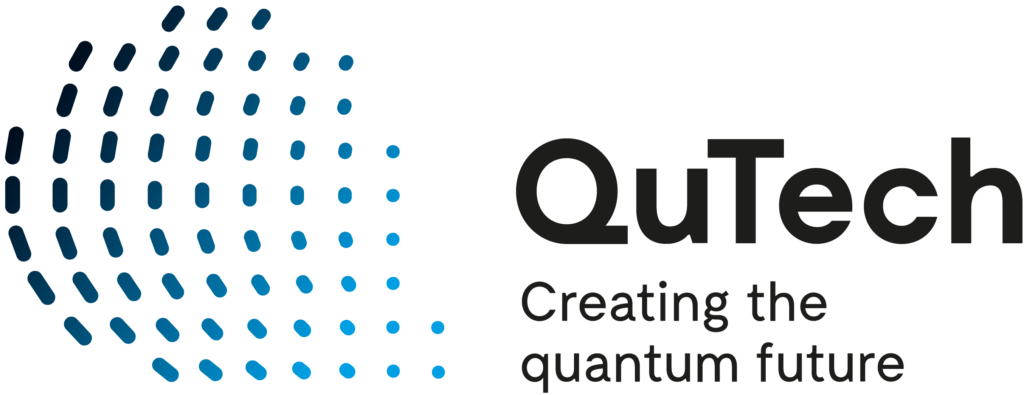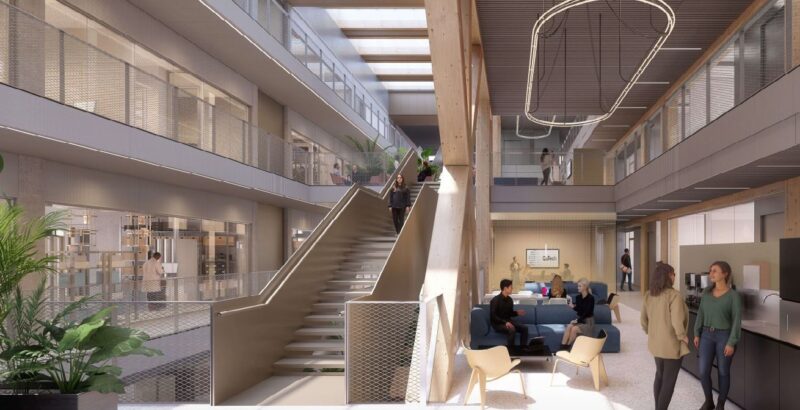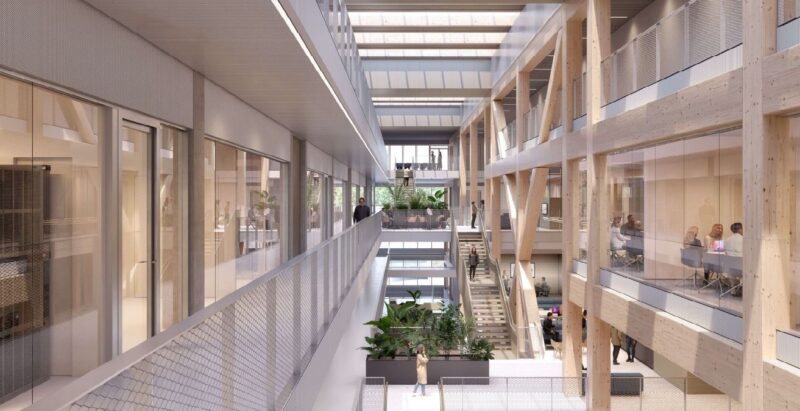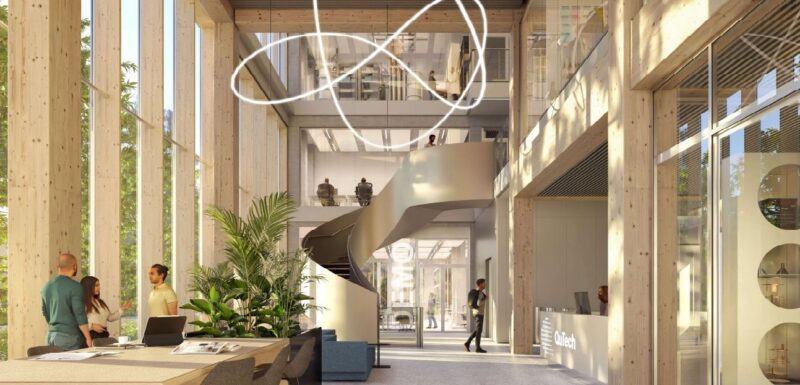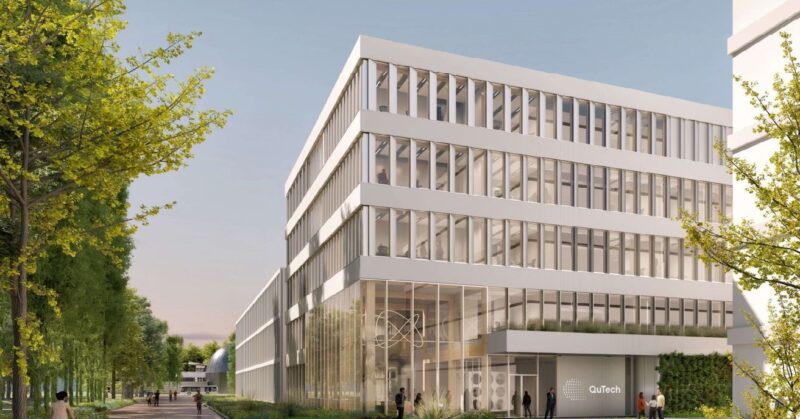New QuTech building
TU Delft is continuously working to renew and improve its campus. One of the developments is the new QuTech building on Campus South. QuTech is a mission-driven interfaculty research institute at TU Delft in the field of quantum technology. The research institute works on scalable prototypes of a quantum computer and an inherently secure quantum internet, bringing together world-class research and breakthrough innovation in one building.
The realisation of this new building for QuTech will create improved conditions, allowing the scientists involved to conduct state-of-the-art research. For the users – academics, staff and engineers in collaboration with industry – the new QuTech building will act as a breeding ground for innovations and new business, technological cross-fertilisation and new partnerships.
The design
The building will offer approximately 13,500 m² of indoor space spread over five floors. There will be workplaces, study areas and laboratories with advanced research equipment. The design is based on two separate building sections with an atrium between them. One building section will be located on the part of the ground that is most vibration-free and therefore suitable for laboratories; the optical labs will be on the ground floor and cryolabs on the floors above. This vibration-free section will be built mainly of concrete. The other building section will mainly be set up as office space. As there are no strict vibration-free requirements for this part, a main load-bearing structure made of wood is used here. Laminated timber was chosen, a sustainable choice with a warm appearance. The central atrium, with long sightlines and connecting stairs, encourages cooperation and spontaneous encounters.
Design by: cepezed
Sustainable construction
The building will be built according to the internationally recognised BREEAM standard. This means that it uses recycled materials, natural insulation, energy neutrality and low-energy installations, among other things. The new QuTech building will thus contribute to TU Delft’s sustainability ambition: a CO2-neutral and circular campus by 2030, aiming for a BREEAM Excellent rating.
Wood is used where possible and concrete where necessary. Among other things, wood is sustainable because it is a renewable raw material and because it stores CO2 even after it has been processed into building material. For the floors, concrete floors with circular raw materials are used as sustainably as possible. The measurement set-ups of the cryolabs are placed in compact glass compartments, ‘aquaria’. Through these ‘aquariums’, hot air is efficiently discharged with cooled air, allowing the space to be used optimally as a workplace.
Facts & Figures
- 13,500 m2 indoor space (gross floor area)
- Over 400 workstations and 100 workstations for master students
- 44 optical set-ups with high vibration requirements (opticalabs)
- 57 cryostats
Opticalab
An opticalab is a laboratory specialising in optical techniques and experiments, often within the context of physical and quantum sciences. It is equipped with advanced optical equipment such as lasers, lenses, mirrors and spectrometers to manipulate and measure light and other electromagnetic radiation.
In an optical lab, experiments are carried out to study, for example, the properties of light, interactions between light and matter, and the behaviour of quantum particles. It plays a crucial role in research into quantum technology and other precision sciences.
Cryostats
Cryostats are devices used to reach and maintain extremely low temperatures, often near absolute zero (-273.15°C). They are commonly used in scientific research and industrial applications, for example in physics, materials science and quantum technology.
Cryostats allow researchers to investigate materials and systems, such as superconductivity, magnetism and the properties of quantum particles. The devices use coolants such as liquid helium, nitrogen, or advanced cooling systems such as closed-cycle cryocoolers.
Planning
- Final design: approved May 2024
- Technical design and tendering: early 2025
- Execution: start summer 2026
- Completion: summer 2028
- Commissioning: summer 2028
More information?
Do you have any questions or would like more information about this new-build development? Please email omgevingsmanagement-crefm@tudelft.nl.
More about QuTech
QuTech was designated as a National Icon by the Ministry of Economic Affairs and Climate Policy in 2014, making it one of the first four organisations in the Netherlands to receive this recognition. This designation highlights QuTech’s ground-breaking research, its economic impact for the Netherlands and its potential contribution to adressing major societal challenges. Today, QuTech is regarded as one of the world’s leading quantum technology research centers.
QuTech’s research and engineering efforts are organized into three divisions: Quantum Computing, Quantum Internet, and Qubit Research. Currently, these divisions and their support teams consist of over 350 inquisitive individuals, with plans for continued growth in the coming years to achieve their ambitious goals.
In addition to numerous scientific breakthroughs and collaborations with companies such as Microsoft, Intel, and Fujitsu, QuTech has also contributed to the development of a thriving startup ecosystem in Delft. Furthermore, QuTech trains an impressive talent pool in collaboration with university faculties. This has a strong positive impact on Delft, South Holland, and the Netherlands as a whole.

